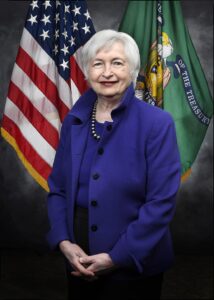The sweeping new set of US sanctions against Russia, which led to the Moscow Exchange halting trading in dollars and euros yesterday, has had limited impact on European asset managers, according to Global Trading sources – although the OTC market could be affected.

Russia has halted trading in all instruments settled in US dollars and euros on the Moscow Exchange (MOEX)’s equity, bond, money and OTC derivatives markets due to new US sanctions over Russia’s war in Ukraine, an announcement on the exchange website confirmed yesterday. Trading in currency pairs with the dollar and euro has also been halted on the FX and precious metals market.
The sanctions, announced by the US Department of the Treasury on 12 June, take “sweeping aim” at the country’s “foundational financial infrastructure and access to third country support” as Russia completes its transition to a full war economy.
US Secretary of the Treasury Janet Yellen said the sanctions “increase the risk” for financial institutions dealing with Russia’s war economy.
“Russia’s war economy is deeply isolated from the international financial system, leaving the Kremlin’s military desperate for access to the outside world. Today’s actions strike at their remaining avenues for international materials and equipment, including their reliance on critical supplies from third countries,” she said in yesterday’s statement.
The new US sanctions target “the architecture” of Russia’s financial system, the US Treasury said, which has been rejigged to facilitate investment into Russia’s defence industry.
The domino effect
Global financial institutions fled Russia when sanctions first hit in early 2022 in response to the initial Ukraine invasion, as nations including the US and UK imposed stringent restrictions on the country and froze Russian banking assets, while Moscow retaliated with a ban on foreign investors selling local securities.
Asset managers including Liontrust, JP Morgan Asset Management, Franklin Templeton and Pictet suspended and eventually wrote down their Russia funds; while the MSCI index freeze on all Russian securities saw ETFs tumble, with BlackRock closing its US$18m MSCI Russia and US$108m Eastern Europe exchange-traded funds. Venues ceased to trade, with European exchanges including LSE, Euronext, Nasdaq and Deutsche Borse halting trading in all Russian names and CCPs such as Euroclear and Clearstream shutting down settlement of Russian securities.
By May 2022, over US$6bn-worth of exposure to Russian or emerging markets funds had been frozen, according to Morningstar data.
Limited impact
After that first frenzy of selling, suspending and write-downs, however, the rest of the world returned to largely business as usual – and according to Global Trading sources, the latest response to Russian sanctions has had limited impact, with most asset managers already exited from their positions.
However, the new freeze on euro and dollar trades on Moscow’s standardised OTC derivatives market could have a bigger impact. “People are trading,” confirmed one buy-side trader, speaking to Global Trading on condition of anonymity. “There is a huge OTC market trying to take on frozen positions at a huge discount.”
“Our Russia fund has been on hold for years, so it doesn’t change anything for us,” said another trader. “As I read it, it’s just the currency angle. You can’t trade vs USD or EUR. But if I really wanted to, I could trade locally in RUB and then FX proceeds back to GBP, for example.”
Russian response
In response to the sanctions, Moscow Exchange said: “The main objective of Moscow Exchange is to ensure the operation of the financial market infrastructure and the reliability of transactions by its participants. In the face of new challenges, Moscow Exchange will continue to provide clients with access to all segments of the trading venue.”
A number of financial institutions have been targeted alongside the Moscow Exchange, including the National Clearing Center (NCC), the central counterparty and clearing agent for, and a subsidiary of, MOEX.
© Markets Media 2024.

